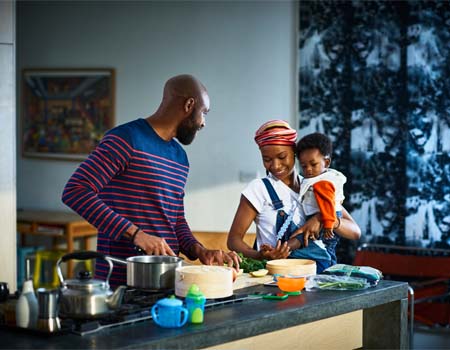50+ facts and statistics about life insurance: a guide for young parents
From comparethemarket
Insurance

An introduction to young parenting
Becoming a parent is an exciting time – one filled with emotions, whatever age you are. While there’s no ‘right’ age to start a family, the average age of first-time parents is over 30, and has been for a while. As the general expectations of what age parenthood should start have crept up, it means having children at a younger age can be an isolating experience.
Whether you’re planning to start a family or have recently had a child, we’ve put together over 65 key statistics related to young parenting. This includes details on when (and why) people are choosing to have babies, challenges for young parents, advice on how to plan for the unexpected and more.
When are people having babies?
According to the Office of National Statistics (ONS), in 2020, the average age of mothers in England and Wales was 30.7 years, while the average age of fathers was 33.7 years.
The age of dads increased slightly from 33.6 in 2019. The age of mums remained unchanged from 2019, ending an 11-year run of consecutive increases in age. The average age of both mothers and fathers remains at a record high.
Although more people are starting a family later in life, many adults start their journey into parenthood in their 20s, according to ONS data:
- Births, where both parents aged 20-24: 28,079
- Births, where both parents aged 25-29: 67,528
- Births, where the mother is aged 20-24, but father age unknown: 79,626
- Births where the mother is aged 25-29, father age unknown: 164,765
If giving birth aged 20-24, this is most likely to be a first child:
- Number of previous children is 0: 48,472
- Number of previous children is 1: 23,455
- Number of previous children is 2: 5,834
- Number of previous children is 3: 1,267
- Number of previous children is 4 or more: 309
- Number of previous children not stated: 289
When compared to the births with parents in their 30s, parents in their early 20s are in the minority:
- Births, where parents aged 30-34 within marriage/civil partnership: 66,294
- Births, where parents aged 30-34 outside marriage/civil partnership: 31,545
- Births, where parents aged 35-39 within marriage/civil partnership: 38,479
- Births, where parents aged 35-39 outside marriage/civil partnership: 14,476
Views on parenting
Starting a career, moving out, having children, getting married – these are all examples of major milestones in life. The age at which people reach them is something often discussed. And while there are differing opinions, these milestones can happen at various ages and in any different order.
Above, we looked at what age people were having children. But what do people think is the right age for becoming a parent? According to a YouGov survey:
- On average, the public thought the ideal age for a woman to be a mother is 28 and the ideal age for men to be fathers is 30.
The responses from different age groups also indicate how attitudes have changed over time:
- Britons aged 25 to 44 think the ideal age for women to be a mother is 30.
- People who are 55 and older say women should have their first baby at 25.
Parenting and careers
One of the reasons often given for having children later in life is the need to prioritise a career. As Tim Vizard, Policy Evidence and Analysis Team, Office for National Statistics, explains, “many parents make changes to their work to help balance work and family life.” And those changes tend to affect mothers more than men:
- In 2019, almost 3 in 10 working mothers said they had reduced their hours to help with childcare, compared with 1 in 20 fathers.
- In 2019, 3 in 4 mothers with dependent children (75.1%) were in work in the UK. This compared with 92.6% of fathers with dependent children.
It’s natural to want an enjoyable lifestyle, a successful career and to start a family. But when it feels like time may be restricted, pressure can build. The answer for many young women has been to delay having children until later in life.
Parenting and marriage
One of the most interesting statistics related to young parents is that in the UK today, people in their 20s are more likely to have children than to be married, according to an ONS exploration of life milestones.
The traditional markers of adulthood are changing with many people living with their partners sooner and having children before marrying later in life. For young adults (20-24 year olds), there are considerably more births outside of marriage:
- Births, both parents age 20-24 (married): 3,580
- Births, both parents age 20-24 (outside of marriage): 24,499

The challenges for younger parents
The pressures of parenthood
Although young parents may face difficulties which relate to their age or circumstances, having a baby can be a time of huge joy – and it should be for parents of all ages. It’s just important they can access the support they need and the opportunities they deserve, areas we discuss in the next couple of sections.
Preparing for the unexpected
Being a parent comes with a lot of responsibilities, including, where possible, preparing for the unexpected. While no-one enjoys thinking or talking about worrying events, such as death or a break-up, parents have to think about what would happen to their children.
The death of a parent
Parental responsibilities are the legal rights and responsibilities you can have as a parent. Mothers automatically have parental responsibility for their children from birth, and most fathers do too if they’re married to the child’s mother or are listed on the birth certificate (certain rules apply).
If one parent was to pass away, there are things to consider:
- If the parents are living together:
○ A mother can appoint a guardian
○ A father can appoint a guardian if he has parental responsibility - If the parents are married and have parental responsibility, responsibility automatically goes to the other parent and either parent can appoint a guardian to act in the event of both parents dying.
- If the parents are separated, it will depend on many factors, including whether both parents had parental responsibility or only one parent.
A guardian is someone with the legal authority to take care of a child if one or both parents pass away. They would have parental responsibility, including looking after and making decisions for your children. In most cases, it would be the other parent, but it can be a complicated situation and varies depending on many factors.
Parents won’t just want to be prepared for who will look after their children, but how they will. That’s why things like having a will and life insurance become important because they can help you look after your children after death. But fewer than 4 in 10 adults have made a will, according to the IRN Research Wills & Probate Consumer Research Report.
And although we don’t have the breakdown by younger parents, having a will is much more common in the 55 and over age category. When you’re younger, it seems planning for what happens after you die isn’t a top priority.
Only married couples have an automatic right to a partner’s estate with or without a will. If you’re not married, the law doesn’t recognise your relationship for inheritance. Unless you have a will, intestacy rules will apply. This outlines what happens to your estate as opposed to any informal requests you may have.
Not only are wills important, but life insurance too.
Unfortunately, it’s not at the top of most people’s thoughts, with estimates that 32.9m (63%) of UK adults have never thought about or do not have an active life insurance policy in place. The coronavirus pandemic has prompted more people to think about cover though, with 5.8m (11%) UK adults have thought about our taken out life insurance policies, leading this trend are 18-34 year olds, with nearly a fifth (19%) considering or taking out life insurance policies.
For those who don’t have life insurance, EY found several common reasons** why:
- 31% believe they can’t afford it
- 30% think it was a waste of money
- 23% feel other priorities like meeting daily expenses are more important
- 16% said they do not trust providers to act in best interest/pay out on claims
**Research carried out in July 2020
But it’s really important to have life insurance as a young parent, as it’s designed to help look after your loved ones after you’re no longer around. When you become a parent, there are greater financial responsibilities – you need to consider how those costs could be covered if you passed away.
The average cost of raising a child to age 18 is £160,692 for couples and £193,801 for a lone parent, according to The Cost of a Child 2021, produced for Child Poverty Action Group by Loughborough University’s Centre for Research in Social Policy.
Getting financial protection which could help your family after you die is important, along with a will to detail your exact wishes.
Relationship breakdown
Break ups – whether that’s a divorce or a separation – do happen. In fact, there were 103,592 divorces granted in England and Wales in 2020, according to ONS.
Couples with children do need to consider what will happen in the event of their relationship breaking down. Parents would need to decide on where the children will live, how much time they’ll spend with each parent, and how they’ll be financially supported, including child maintenance.
If you agree, you don’t have to make the agreement legally binding. If you want it to be legally binding, you can get a solicitor to draw up a consent order to legally confirm the agreement. This needs to be signed by both parties and go through a court order.
If you do not agree on everything, then you can try mediation, and then get a court to decide on anything that you cannot agree. A mediator is a third party who won’t take sides and can help you and your ex-partner sort out any differences.

Support available for young parents
Having support is important for all parents, whether that’s grandparents nearby, financial grants or building out a network of other parents. Especially throughout the first few years, support can make all the difference to parents.
Supporting young parents
With the right support, there’s no reason why young adults can’t embark on the exciting journey of parenthood with confidence. Although there seems to be a growing expectation to start a family later in life, people can choose what’s right for them.
Older research highlighted that many young parents didn’t know what benefits were available. As a result, they weren’t always claiming what they were entitled to. It’s not hard to imagine that busy parents-to-be might not discover grants or other support that they could qualify for – especially if it’s their first child. To wrap up our exploration of statistics related to young parents, let’s take a look at some of the support available.
Educational support
- Free early education entitlement. All 3 to 4-year-olds in England are entitled to 570 free hours per year. This works out as 15 hours a week for 38 weeks of the year, but you can choose to take fewer hours over more weeks. Parents of 3 to 4-year-olds are eligible for 30 hours free childcare a week, if they meet certain criteria. Parents with two-year-old children can get free early education again, if they meet certain requirements.
- Care to Learn. Available to young parents in England aged 20 and under who are on publicly-funded courses, including at school, in sixth form or in college, this scheme helps teenage parents with childcare and travel costs while they study.
- Discretionary Learner Support scheme (DLS). DLS can be used by parents if they are facing financial difficulties to cover further education course costs in addition to childcare.
Financial support
Becoming a parent is not only hard work, but it can be expensive. Depending on their circumstances, young parents may be entitled to support, including:
- Child Benefit
- Child Tax Credit
- Working Tax Credit
- Sure Start Maternity Grant
- Childcare grant
The GOV.UK website outlines all of the financial help which may be available.
General parenting support
The benefits of support for parents are twofold: parents feel better in themselves, and they’re able to support their children.
Government support for young parents includes the Family Nurse Partnership, a home visiting programme for first-time young mums and families. Visits start during pregnancy right through until the child is aged between one and two. A family nurse can help with all aspects of parenting, including:
- Parent-child attachment
- Breastfeeding
- Immunising your baby
- Child development
- School readiness
Throughout the UK, parents can also find Sure Start Children’s Centres. They’re designed to provide help and advice to parents on child and family health, parenting, money, training, and employment. They’re a great place to help find information on other local services too, such as childcare, early education and healthcare. Some centres also provide early learning and day care.
In addition to government-provided support, numerous charities exist to help parents and children. For example, Action for Children parenting programmes include:
- Incredible Years: sharing ideas for young children
- Incredible Babies: teaches new parents how to support the baby in their first year of life
- HENRY: nutrition health and exercise for the very young
- Freedom: helping mums and children who have been through domestic abuse
You should always check out what’s available to you locally as well, as clubs and baby groups are common. Classes could include music for children, swimming, storytelling, arts and craft, and so on. It’s a good way for parents to meet other adults, as well as for children to spend time with other babies.
Parents might also find support online, or on apps. Apps designed specifically for parents include:
- Mush
- Peanut
- Dadapp
- Mummy Social
- Bumply
Useful links
NSPCC support for parents guide
Parent talk online advice service
Home-Start: supporting young mothers
Impact of Covid-19 on new parents: one year on
Neonatal care through a young parent lens
For more on this story go to: comparethemarket





